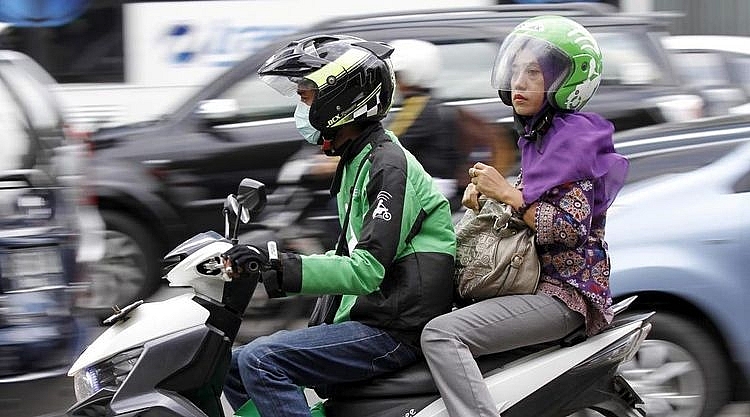Go-Jek to invest $500 million into Southeast Asian expansion
 |
| Go-Jek to invest $500 million for expanding operation in four countries in Southeast Asia. Source: Dealstreetasia |
According to newswire Dealstreetasia, Go-Jek will initially offer ride-hailing services in these new markets, with plans to add additional services later. Beside ride-hailing, it offers digital payments, food delivery, logistics, and on-demand services in its home market of Indonesia. It claims to have over 900,000 registered drivers throughout the country and says it facilitates over 100 million transactions per month.
Commenting on the expansion plan, Go-Jek founder and CEO Nadiem Makarim said: “Consumers are happiest when they have choice, and at the moment, the people in Vietnam, Thailand, Singapore, and the Philippines do not feel that they are getting enough when it comes to ride-hailing.”
“We hope that as we arrive in new markets, we will quickly become everyone’s go-to lifestyle app. That is our aspiration. In the meantime, we hope our presence will provide the competition markets need to thrive,” said Nadiem Makarim.
Established in 2010 as a motorcycle ride-hailing service, Go-Jek has evolved into an on-demand mobile platform and a cutting-edge app, providing a wide range of services that include transportation, logistics, mobile payments, food delivery, and many other on-demand services.
| We hope that as we arrive in new markets, we will quickly become everyone’s go-to lifestyle app. That is our aspiration. In the meantime, we hope our presence will provide the competition markets need to thrive. |
Go-Jek expects that it will soon become everyone’s go-tolifestyle app in the new markets. However, what is Go-Jek’s “weapon” to fight the already established heavyweight Grab and other competitors who released plans to invest in Vietnam?
Go-Jek’s advantages are unclear for now and it remains a question how it plans to deal with competitors and attract drivers and customers in Vietnam, excluding the opinion posted on the company website that drivers joining the Go-Jek house will see their income increase and reach more customers. Besides, drivers will have access to health and accident insurance and financial services, as well as affordable automatic payments and many other benefits.
Meanwhile, in Vietnam Grab has solidified its foothold in the ride-hailing sector, and the new players who expressed ambition to enter the market are issuing numerous attractive benefits for both drivers and customers.
Notably, Singapore-based transportation startup MVLchain, which owns the Grab-like platform MVL, is planning to utilise blockchain technology for the first time in Vietnam.
Along with utilising blockchain technology, MVL will focus on luring in customers via a low-fare policy instead of pouring money into promotion programmes like Grab and Uber.
Fastgo offers advantages for both drivers and customers. Notably, with the exception of a fee to join the app, drivers will not have to pay commission to the operators of Fastgo.
Customers will enjoy lower fares than with both traditional taxi brands and Grab. Besides, customers will be insured against any incident occurring during the trip, including traffic accidents or personal injury due to a conflict with the driver.
Besides, Phuong Trang Futa Group, a leading passenger transportation and parcel delivery company in Vietnam, invested VND2.2 trillion ($96.53 million) into developing the ride-hailing app Vivu and changed its name into Vato.
Vato will not lure in customers via promotion programmes. Instead, it will offer numerous advantages. Notably, drivers and customers can discuss the fare based on an initial fare issued by Vato. For example, after a customer orders a vehicle for a 5-kilometre ride, Vato will offer a fare of VND50,000, which the customer can then discuss with the driver.
What the stars mean:
★ Poor ★ ★ Promising ★★★ Good ★★★★ Very good ★★★★★ Exceptional
 Tag:
Tag:
Themes: Ride-hailing services
Related Contents
Latest News
More News
- VNPAY and NAPAS deepen cooperation on digital payments (February 11, 2026 | 18:21)
- Vietnam financial markets on the rise amid tailwinds (February 11, 2026 | 11:41)
- New tax incentives to benefit startups and SMEs (February 09, 2026 | 17:27)
- VIFC launches aviation finance hub to tap regional market growth (February 06, 2026 | 13:27)
- Vietnam records solid FDI performance in January (February 05, 2026 | 17:11)
- Manufacturing growth remains solid in early 2026 (February 02, 2026 | 15:28)
- EU and Vietnam elevate relations to a comprehensive strategic partnership (January 29, 2026 | 15:22)
- Vietnam to lead trade growth in ASEAN (January 29, 2026 | 15:08)
- Japanese business outlook in Vietnam turns more optimistic (January 28, 2026 | 09:54)
- Foreign leaders extend congratulations to Party General Secretary To Lam (January 25, 2026 | 10:01)

























 Mobile Version
Mobile Version